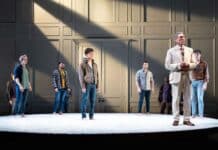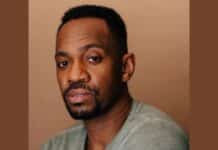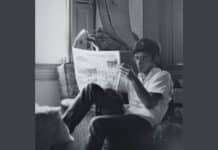This past summer, DC audiences experienced the world premiere of We Are Gathered at Arena Stage (directed by Kent Gash). The newest work by celebrated playwright Tarell Alvin McCraney, We Are Gathered traces the difficult romance between Tre and Free, two Black male artists considering marrying each other. But Tre struggles with fears of commitment, his difficult past, and the fact that he met Free while cruising at a park.
When I wrote about We Are Gathered for this publication, I found the play overwhelming and fascinating. Tre’s attempt to move beyond his traumatic origins mirrored McCraney’s desire to write beyond the adolescent protagonists that have defined his oeuvre. We Are Gathered marked a career turning point for McCraney. The show acknowledged all of the playwright’s creative influences and painful memories, but strove toward the future. We Are Gathered’s ending had a finality rarely seen in McCraney’s plays, with Tre telling his lover, “You decided to be here while I ran in a circle. And now the circle is complete. The round ‘o’ of the world is formed here.”

Now, a revival of McCraney’s most famous play, The Brothers Size, is playing at The Shed in New York City, a co-production with Geffen Playhouse. The play (first produced in NYC at the Public Theatre in 2007 and presented by 1st Stage in 2019) also follows two Black men: the boisterous Oshoosi Size comes out of incarceration to stay with his older brother, Ogun Size, a car mechanic. A “round ‘o’ of the world” is now staged literally at The Shed. At the beginning of the production, an actor pours white sand in a circle around the performance space, as if blessing a temporary altar. The script describes this moment as an “opening invocation [that] should be repeated for as long as needed to complete the ritual.” In The Brothers Size, characters try to achieve wholeness, but unlike in We Are Gathered, their circle ultimately feels incomplete.
The Brothers Size is timely and timeless, but there’s danger in McCraney revisiting such hallowed ground (he co-directs this Shed revival alongside Bijan Sheibani). How can McCraney move beyond coming-of-age narratives if he’s revisiting past ones? If We Are Gathered embraces the future, why is McCraney once again looking backward in The Brother Size? Yet watching both plays within a few months, I found these tensions more illuminating than confusing. The circles staged in We Are Gathered and The Brothers Size overlap, making Tre and Free’s lovely conclusion more unresolved, and making Oshoosi and Ogun’s open-ended conclusion more final.
—
The Brothers Size has a recurring quality: strained conversations between the Size brothers refract through dreams and memory. Oshoosi’s drawn to Elgba, a poetic friend from prison who also searches for freedom — and their connection takes a startling turn, undergirded by state violence.
Any summary of The Brothers Size’s plot risks reducing the show to a tragedy. But McCraney’s true focus is on how language creates simultaneous intimacy and distance. Characters narrate their own stage directions; their asides to the audience confirm their status as achingly real people and abstractions. When Oshoosi asks Ogun, “Why you got to be so hard all time?,” the question is both a joke and an accusation. Why can’t Ogun drop his hardened demeanor to show levity, grace? Why can’t the hard world outside of this play deliver grace, too?
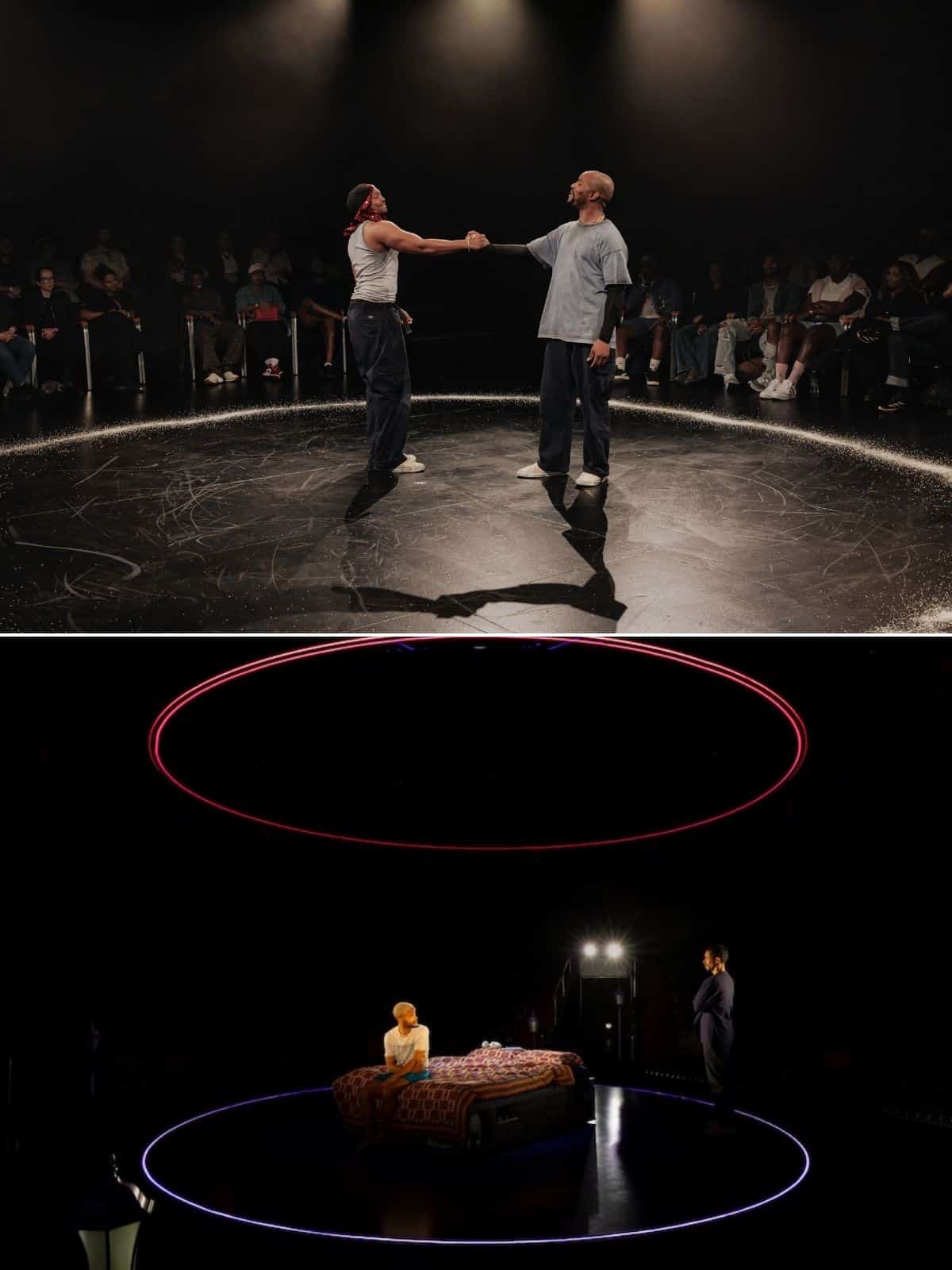
Watching these productions of The Brothers Size and We Are Gathered, I’m struck by how similarly they’re staged. McCraney, Sheibani, and Gash place their performances in the round, with audiences on four sides. This allows asides and musical performances in both to feel surprisingly direct. We Are Gathered’s language also feels both intimate and distant. Tre’s monologues reveal a tortured mind that can’t plainly state how it feels. He’s a perfect foil to Ogun, who saves a monologue for the right moment, and unleashes it with a simplicity that’s devastating.
Yet Tre and Ogun feel like theatrical brothers. Whether they’re verbose or silent, extroverted or repressed, Black men in McCraney’s works (and America) still feel a desperate sense of dread. It’d be tempting to trace a linear progression from The Brothers Size to We Are Gathered: the Size brothers yearn for freedom in the “distant present,” and then Tre and Free actually experience more societal freedoms in 2025. However, there are moments in The Brothers Size when characters feel utterly safe, and many moments in We Are Gathered that acknowledge the anguish of 2025’s political climate. Freedom in both plays feels arbitrary. Age, time, and circumstance won’t necessarily save any of these characters.
McCraney emphasizes this fact through his casting in The Shed’s The Brothers Size. Although the script notes that Ogun and Elegba are “late 20s” and Oshoosi is “early 20s,” this production’s cast includes longtime McCraney collaborators who are middle-aged. Alani iLongwe embodies Oshoosi with an overcompensating bravado, trapped in a pre-prison adolescence despite being physically older. André Holland’s Ogun offers a steady counterweight, able to slow down the dialogue’s tempo (an older Ogun makes his paternalism feel even more pointed). At first, I wanted to compare this casting to that of Dance Nation. It’s older actors portraying their lost youth. However, the actors’ mix of exuberance and weariness forces me to acknowledge that the Size brothers were never granted the privilege of “youth” or “innocence” in America.
—
For me, the most refreshing element of We Are Gathered was its unabashed queerness. McCraney’s works often follow queer men, but their sexuality might be a burgeoning identity (Eric in Wig Out!) or an open secret (Pharus in Choir Boy). In contrast, Tre and Free proudly state, “We’re here, we’re queer,” enrich themselves in queer media, and surround themselves within the LGBTQ+ community. So I was hesitant watching The Brothers Size in NYC — would queerness be forced into subtext or subterfuge? Elegba offers a particularly thorny character to stage nowadays: without careful direction, his libidinal movements can feel like entrapment.
Thankfully, this production of The Brothers Size doesn’t lose the queerness of Tre and Free. McCraney and Sheibani wisely bring some of Ogun’s stillness into Elegba’s scenes. Actor Malcolm Mays often portrays Elegba like he’s trapped in a reverie, not completely in control of his hands or mouth. Sexuality is a secure, inherent part of Elegba’s identity. But it’s still a mystery to him, and to us.
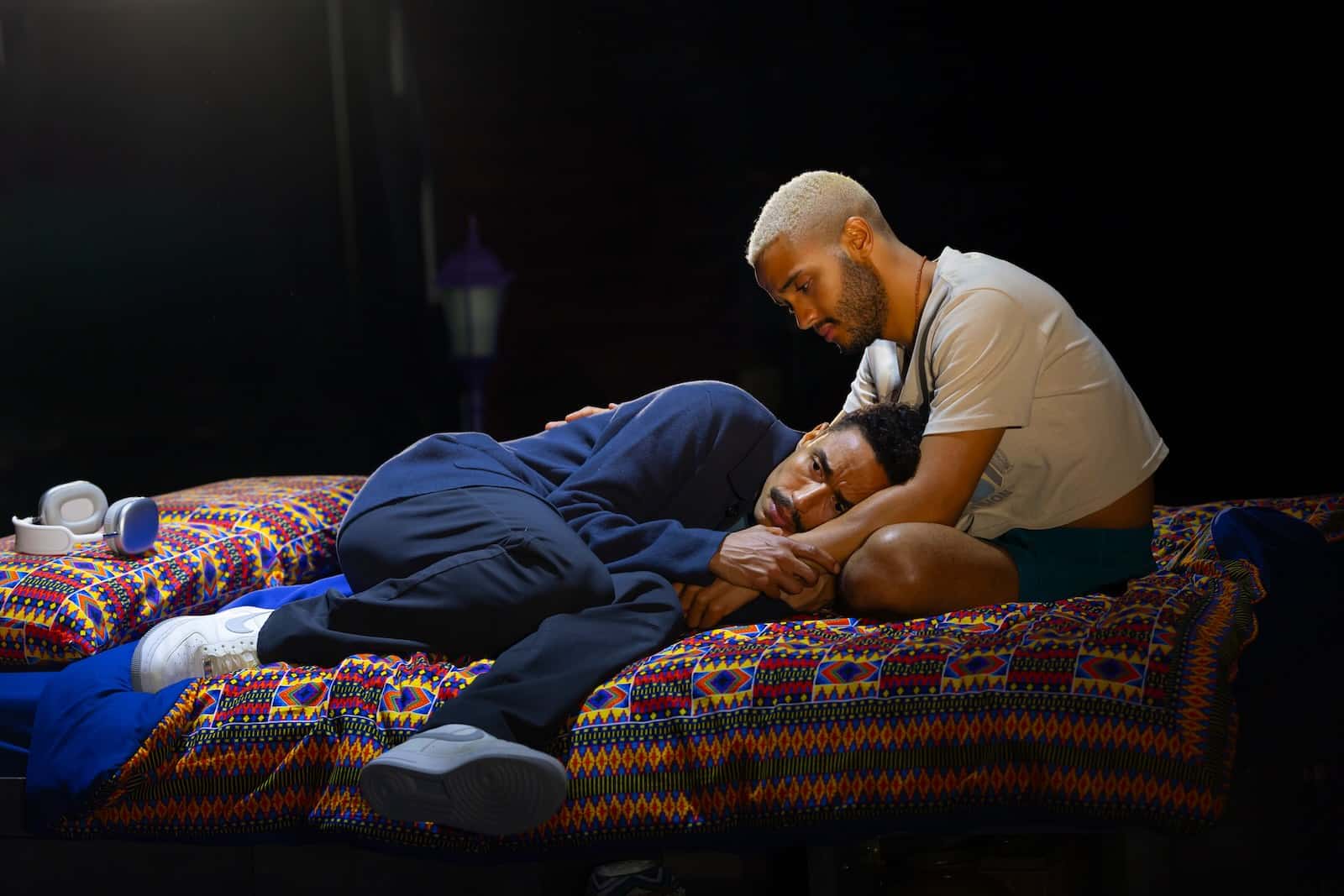
McCraney’s other works also now alleviate some of the paranoia around The Brother Size’s queer desires. Ogun plays many roles for Oshoosi throughout the show: role model, friend, bully, father figure, twin, mirror. Feeling drawn to someone of the same gender — not knowing if it’s identification, attraction, or jealousy — is a uniquely queer experience, but it’s also one that’s taboo. 2007 audiences watching The Brothers Size might have been shocked to witness this dynamic, but McCraney’s other art (Moonlight, We Are Gathered) now prepares me to recognize this dynamic across multiple narratives, and multiple lifetimes.
It’s worth noting that although I’ve seen three McCraney productions — We Are Gathered, The Brothers Size, and Choir Boy on Broadway — the queer sex scenes in all were staged abstractly. But queerness encompasses different kinds of physical performance, too. We Are Gathered featured an absurdly funny parody of “trade” masculinity that quickly became fabulous. Something similar happens here. Oshoosi and Ogun lip-sync to a song late in the show, and the smooth comedic gags take on the camp of drag. Even after a Size brother’s painful confession of “I fucked up,” I’m reminded of Michaela Angela Davis’s assertion that “[Black style] couldn’t be burned up or shot up or locked up. You can’t fuck it up.”
—
Even though The Brothers Size functions as a complete story, it’s often understood as a brief glimpse into a long, emergent history. Ogun and Oshoosi are named after Yoruban spirits, so their personal woes take on the weight of a spiritual struggle. The Brothers Size is the middle chapter of McCraney’s trilogy The Brother/Sister Plays, so Ogun is haunted by the choices of a previous play. Maybe Ogun senses that his actions will haunt future stories.
At this point, Ogun’s actions haunt all of American theater. McCraney’s The Brother/Sister Plays has inspired too many contemporary plays to count (it’s so influential that, like the past, you can’t escape it). I’m reminded of a scene where Elegba brings a broken-down car to Ogun’s shop, and Ogun remarks, “…those one of those American Classics. / Those, ‘I will run longer and stronger then the human / Body’ cars. Man, please that car got plenty of run in it.” The Brothers Size has since become its own American classic. The play will outlast all of the bodies onstage in NYC.
Somewhere in this country — in a college classroom, in a regional theater, in a reader’s imagination, in an audience’s memory — Oshoosi and Ogun are running. They’re collapsing or returning or leaving each other. Even with the benefit of safety and time, maybe it’s a sign of grace that McCraney still joins their forever struggle.
Yet part of what made We Are Gathered so exciting to me was its dedication to closing the book on the past, to finally achieving some kind of peace. The Brothers Size may always be trapped in the middle of generational, spiritual, and theatrical narratives. But McCraney gracefully takes some of the decisiveness of We Are Gathered and shifts it over to this Shed production. I’ve reread The Brothers Size countless times, but it was only watching this performance — and somehow feeling McCraney’s metatheatrical presence — that the play’s ending finally felt like a relief. Just like Tre and Free, McCraney lives with a freedom the Size brothers can only imagine: McCraney can safely revisit his past. He can return home.

